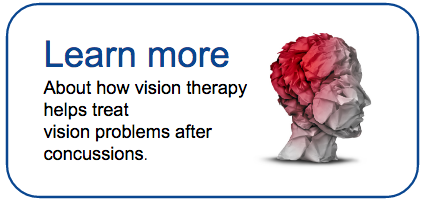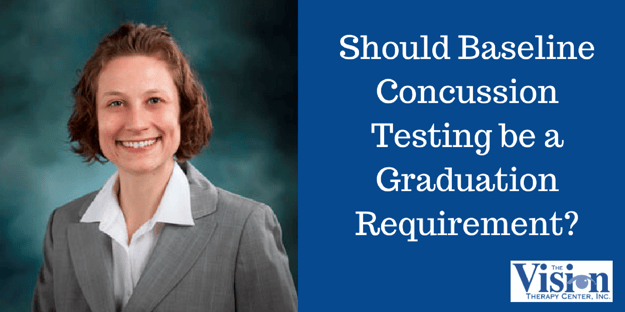
Baseline concussion testing has become the norm for high school athletes. But according to Dr. Brandi Boan, baseline testing is a good idea for everyone, not just athletes. It’s why she thinks it should be a graduation requirement that could help you the rest of your life.
Dr. Brandi Boan is a licensed clinical psychologist and a clinical neuropsychologist at the Mathers Clinic. She conducts a range of behavioral, emotional, cognitive and neuropsychological assessments for children and adults. It’s why we reached out to her regarding baseline testing.
We’ve blogged before about why measuring the brain’s performance with baseline testing is a good idea for athletes. Now let’s take a closer look at exactly what’s included with baseline testing, and why Dr. Boan believes it should be mandatory for everyone.
Baseline Testing Should be a Graduation Requirement
While many of us equate baseline testing strictly with concussions from sports injuries, Dr. Boan explained that it can also be used to assist with detecting neurocognitive disorders such as concussions from other types of accidents, Alzheimer's disease and vascular issues.
“From my perspective, in a perfect world, baseline testing of cognitive and neurocognitive functions would be a high school graduation requirement,” Dr. Boan said.
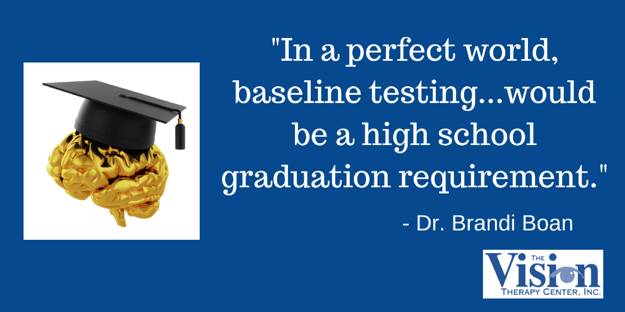
Baseline testing can be used later in life in the event cognitive issues arise. Dr. Boan explained that neurocognitive testing is standardized based on age, so the aging process won’t drastically impact comparisons between current and past results.
Neuropsychologists can use the results to spot changes in a person’s cognitive abilities, which assists with diagnosis of a neurocognitive disorder.
What is Concussion Baseline Testing?
There are a number of different approaches to testing, but baseline testing typically includes a cognitive assessment; providing an overall IQ, as well as different index scores that measure:
- Verbal ability
- Perceptual reasoning
- Working memory
- Processing speed
Baseline neurocognitive testing includes visual-spatial skills and visual construction. Additional assessments can evaluate verbal and visual memory on a short and long-term basis. These scores can be compared to statistical norms for your age group.
Some aspects of your baseline score will change over time. “Your processing speed will decrease as you age, but not dramatically, and the standardized normative data takes this into account,” Dr. Boan said.
In sports-related baseline testing, often a short neurocognitive assessment is utilized to provide a brief overview of verbal, visual and general cognitive abilities.
How is Vision Measured in Baseline Testing?
Readers should remember that Dr. Boan is a neuropsychologist, and the testing she conducts of neurocognitive skills (such as visual-spatial skills and visual construction) overlap with areas that we, as developmental optometrists, will examine as one part of our functional vision test - perceptual testing.
Functional vision is how your entire visual system -- the eyes, the brain, the visual pathways -- work together to help you interact with your environment. Functional vision includes the visual skills areas of eye teaming, eye focusing and eye movement.
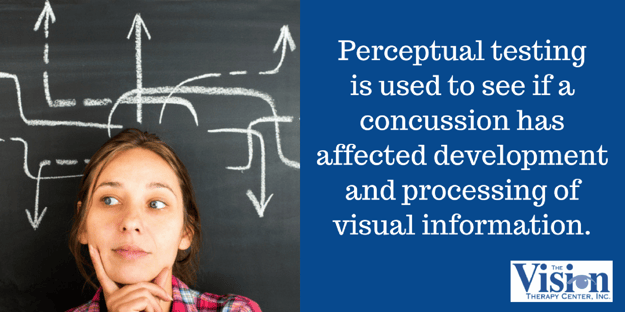
Then the functional vision exam tests for difficulties in these three areas. If there are difficulties with functional vision, we then recommend that perceptual testing be done to see how those vision problems have affected development and current processing of visual information.
During perceptual testing, we examine skills such as:
- Presence or absence of primitive reflexes
- Bilateral integration
- Laterality
- Directionality
- Visual perceptual attention
- Perceptual speed
- Visual memory
- Visual motor integration and organization
- Auditory attention
- Auditory visual integration
- Auditory discrimination
What if an Injury Shows a Difference From the Baseline Scores?
If a person suffers a mild concussion, symptoms will typically resolve in 7-10 days. If the injury is more complicated and the symptoms persist after two weeks, a patient may need to visit a physician, as well as a neuropsychologist like Dr. Boan, to determine a treatment plan.
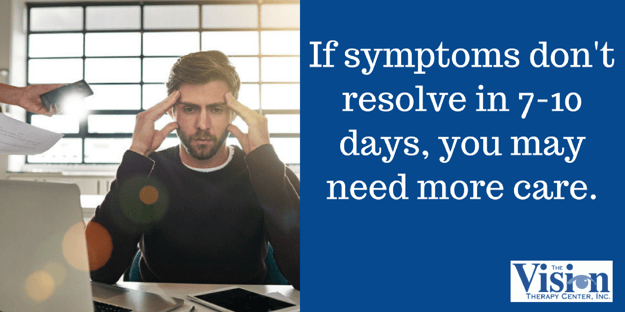
When a person comes to Dr. Boan, she conducts an interview for background information on the patient. If there is previous baseline testing, she’ll request those results. Upon determination if an assessment is needed, the patient will return for neuropsychological testing.
The testing includes measures of cognitive ability, short and long-term memory, visual-spatial and visual-constructional skills, executive functioning, and mood regulation.
What are the Different Ways Vision Can be Affected by a Brain Injury?
In the case of ‘mild’ brain injuries, residual visual symptoms are typical. A patient may experience symptoms that include blurred or double vision, difficulty focusing, perceptual difficulties, and perhaps difficulty with tracking movement.
For complex concussions, vision difficulties are more likely. “These are the individuals who really need vision therapy,” Dr. Boan said. They have difficulty with depth perception, visual-spatial skills, blurred vision, and may have difficulty ignoring things or paying attention to things in their periphery.
If Symptoms Persist Don’t Wait
Dr. Boan emphasized the importance of speaking with a physician if symptoms continue past 28 days. “Kids and parents need to be aware of what we are learning from concussions,” she warned.
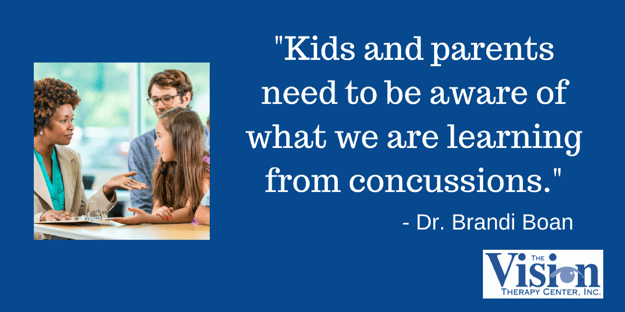
Her biggest concern was returning to work or sports too quickly. The brain is neuroplastic. If a patient returns too quickly and causes more damage, the brain won’t be able to easily reorganize itself. It could affect cellular and neurochemical activities, creating what Dr. Boan referred to as “increased complication.”
These are the types of brain injuries that affect football players and pro soccer players and result in Chronic Traumatic Encephalopathy.
The “brain tangles, atrophy, and other abnormal changes” also make you more likely to develop a neuro-cognitive disability in the future. One of Dr. Boan’s main concerns is that the issues could affect students as they move into adult life and have to multitask in a higher education environment.
Baseline Testing for Tomorrow...and Today
We’ve explained in numerous posts how functional vision is affected by concussions. Dr. Boan’s recommendation for baseline testing for everyone makes sense not just for the health of your functional vision, but your cognitive abilities today and for the rest of your life.
To pursue baseline testing, individuals will want to contact a physician and/or a neuropsychologist. After an interview with a neuropsychologist, a determination of benefits can be made to know if insurance will cover the cost of the testing.
Generally speaking, most insurance plans cover neuropsychological assessments. However, some require a referral and/or authorization (completed by the neuropsychologist and sent to the insurance company).
A Google search for a local neuropsychologist will help find a provider. Parents/individuals should keep in mind there is a difference between a psychologist and a neuropsychologist, as a neuropsychologist has additional training.
In addition, we recommend a functional vision exam, which can also establish a baseline for your visual skills, and may also expose some undetected vision problems. Click here to see if you may have some of the symptoms of a functional vision problem.

